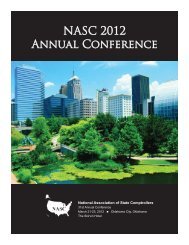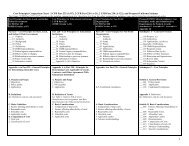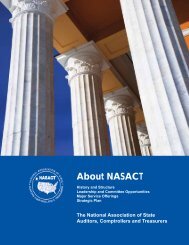Advisory Committee on Tax Exempt and Government Entities (ACT ...
Advisory Committee on Tax Exempt and Government Entities (ACT ...
Advisory Committee on Tax Exempt and Government Entities (ACT ...
You also want an ePaper? Increase the reach of your titles
YUMPU automatically turns print PDFs into web optimized ePapers that Google loves.
<strong>Government</strong>al Relati<strong>on</strong>ship <strong>and</strong> Communicati<strong>on</strong> Between the Internal Revenue Service <strong>and</strong> Indian Tribal <strong>Government</strong>sI. EXECUTIVE SUMMARYThe Federal <strong>Government</strong> maintains a government-to-government relati<strong>on</strong>ship with over560 federally recognized Tribes each with their own unique culture <strong>and</strong> traditi<strong>on</strong>s.There are many challenges to effective government-to-government relati<strong>on</strong>ships withTribal <strong>Government</strong>s, with effective communicati<strong>on</strong> <strong>and</strong> overcoming a l<strong>on</strong>g history ofbasic distrust by the Tribes being key challenges.The IRS, like all other federal agencies, must relate to its Tribal <strong>Government</strong> customerswithin a government-to-government relati<strong>on</strong>ship. While the IRS Office of Indian Tribal<strong>Government</strong>s (“ITG”) works hard to maintain <strong>and</strong> enhance these government-togovernmentrelati<strong>on</strong>ships, during our research for last year’s report the <strong>ACT</strong> discoveredsome areas of c<strong>on</strong>cern in these relati<strong>on</strong>ships that needed further analysis. This reportwill highlight areas of the IRS’s government-to-government relati<strong>on</strong>ships with Tribes thatappear to be working <strong>and</strong> those areas that need improvement, in some casessubstantial improvement.C<strong>on</strong>sultati<strong>on</strong> is a cornerst<strong>on</strong>e of the Federal <strong>Government</strong>’s government-to-governmentrelati<strong>on</strong>ship with Tribes. We have serious c<strong>on</strong>cerns regarding the lack of anypublicati<strong>on</strong> or implementati<strong>on</strong> of the Department of the Treasury’s little-knownc<strong>on</strong>sultati<strong>on</strong> policy applicable to the development of regulati<strong>on</strong>s affecting Tribal<strong>Government</strong>s. The Treasury Department policy should be publicized to the Tribal<strong>Government</strong>s, as well as fully implemented. There is no excuse for the TreasuryDepartment’s apparent c<strong>on</strong>clusi<strong>on</strong> that the policy did not apply with respect to a numberof important regulatory initiatives that will have profound impacts <strong>on</strong> Tribal<strong>Government</strong>s.Likewise, we have serious c<strong>on</strong>cerns regarding the IRS’s l<strong>on</strong>g delay in adopting its ownc<strong>on</strong>sultati<strong>on</strong> policy, as it informed the Tribes it was committed to do during a nearly twoyearprocess that took place in 2003 <strong>and</strong> 2004. The IRS should resume its efforts toadopt the c<strong>on</strong>sultati<strong>on</strong> policy that was drafted by a joint IRS-Tribal working group <strong>and</strong>circulated to all of the Tribes in 2004, for applicati<strong>on</strong> to matters affecting the Tribes towhich the Treasury Department policy does not apply.We also have recommendati<strong>on</strong>s for improving some of ITG’s existing mechanisms forensuring str<strong>on</strong>g day-to-day relati<strong>on</strong>ships with Tribal leaders <strong>and</strong> Tribal financepers<strong>on</strong>nel <strong>on</strong> matters of more routine tax administrati<strong>on</strong>. We believe that theseimprovements will provide a better envir<strong>on</strong>ment for carrying out true <strong>and</strong> respectfulgovernment-to-government relati<strong>on</strong>ships with the Tribes, <strong>and</strong> for achieving maximumtax compliance. In additi<strong>on</strong>, in an improved envir<strong>on</strong>ment, Tribes will have a better forumfor raising their c<strong>on</strong>cerns <strong>on</strong> tax administrati<strong>on</strong> <strong>and</strong> policy matters, having them heard,<strong>and</strong> having them “trickle up” or “trickle over” from the specialist level to the Director ofITG to other divisi<strong>on</strong>s <strong>and</strong> officials in the IRS <strong>and</strong> the Treasury Department ifappropriate, which will facilitate meaningful c<strong>on</strong>sultati<strong>on</strong>. The most significant of theserecommendati<strong>on</strong>s, all of which are explained in more detail below, are as follows:ADVISORY COMMITTEE ON TAX EXEMPT AND GOVERNMENT ENTITIES (<strong>ACT</strong>) June 11, 2008 1













